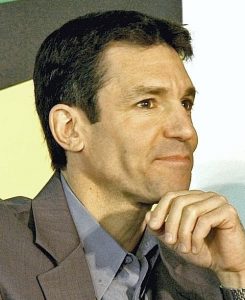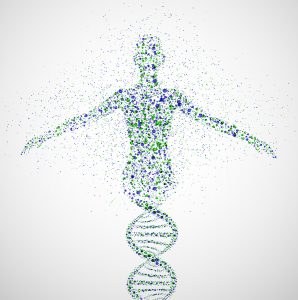Your genes are not your medical destiny.

Dr. David Katz
With relatively uncommon exception, that is the rule established by ground-breaking research published over recent years, and nicely illustrated by a 2008 paper in the Proceedings of the National Academy of Sciences. That rule could, and perhaps should, remake the way you play the game of life.
The illustrative trial was a pilot study of 30 men with early stage prostate cancer who were eligible to be observed carefully for disease progression without undergoing surgery, radiation or chemotherapy. These men were enrolled into a trial called GEMINAL, developed and implemented by my friend, Dr. Dean Ornish, and his colleagues at the University of California, San Francisco.
The study took advantage of often indolent prostate cancer to assess the effects of a lifestyle intervention, without the confounding influences of medical or surgical cancer treatments. The men participating in the GEMINAL study received a lifestyle intervention: low-fat, whole foods, plant-based nutrition; stress management techniques; moderate exercise; and participation in a psychosocial support group. The study lasted three months.
Many of the usual measures of overall health were tracked in this study: weight, blood pressure, cholesterol levels and so on. They all improved significantly, as one would expect. The PSA, a tumor marker for prostate cancer, improved, but only trivially.
But what makes this study unique — and groundbreaking — is that it measured health markers beyond the list of usual suspects. Using advanced laboratory techniques, the investigators measured the effects of the intervention at the level of the genes.
What they found was remarkable. By examining prostate biopsy specimens before and after the three-month intervention, they saw significant changes in gene activity. Roughly 50 genes associated with cancer suppression became more active in generating RNA, and nearly 500 genes associated with cancer progression became less active. The pattern of change observed in gene activity was consistently, and decisively associated with lower risk of cancer development and progression.
Lifestyle has a powerful influence
We have long known that lifestyle has a powerful influence on health across a wide array of outcomes. It is not news to you that eating well, being active, controlling your weight, managing stress and not smoking, for instance, can influence your fate.
But we have tended to think in terms of “nature versus nurture” — with lifestyle and genetic influences  on health as independent and potentially competing forces. This study, and others like it, ostensibly change the game. They suggest that lifestyle and genetics are not independent after all, but interact. Even our genes are influenced by lifestyle choices. We can, it seems, nurture nature.
on health as independent and potentially competing forces. This study, and others like it, ostensibly change the game. They suggest that lifestyle and genetics are not independent after all, but interact. Even our genes are influenced by lifestyle choices. We can, it seems, nurture nature.
A recent study, however, generated widespread media attention and propagated the notion that cancer is mostly a random event. Which is it?
First, regarding that recent study, the researchers studied the rate of potentially cancer-causing genetic mutations in different tissues. They then extrapolated potential cancer occurrences, based on a computer model derived from the number and frequency of cell divisions, and the frequency of mutation. The research showed that many ominous mutations happen spontaneously, meaning they are not passed down from one generation to the next; and such mutations happen more often in tissues that divide often.
The study did not examine actual cases of cancer in actual people. The work was in isolated tissues, and only about mutations; not about clinically relevant cancers in actual bodies. If you are now wondering why all the media hoopla- well, that makes two of us.
Gene mutation does not equal cancer.
Cancer is a decades-long process, not a sudden “sneak attack.” The predictable course of its development provides many opportunities for prevention. There are three key stages in the development of cancer: initiation, promotion, and expression.
Initiation refers to genetic mutation that has the potential to result in unregulated cell growth. The recent study indicates that such mutations are more likely to occur spontaneously than be handed to us from our parents, making them “random.” But otherwise, they are not really random. We know that carcinogens, including toxic exposures such as radiation and chemicals, increase the frequency of such mutations. Healthy living can reduce that frequency.
When mutations do occur, whether despite our best efforts or for want of them, most are not carcinogenic. For a mutation to be carcinogenic, it must occur near, and affect, a growth-regulating gene called an oncogene. Situated normally next to other genes, oncogenes provide signals to cells about when to divide, and when to stop. Removed from their normal position by a mutation, oncogenes can signal the non-stop cell divisions that characterize cancer.
But even a carcinogenic mutation is not cancer. Promotion, the second stage of cancer development, or carcinogenesis, refers to development of a whole colony of abnormal cells. Any exposure, condition, or circumstance that favors the growth of this colony of abnormal cells may be considered a cancer promoter. Promoters are often quite distinct from initiators, although some exposures, such as tobacco, play both roles.
The final stage in cancer development is expression. Even a colony of abnormal cells may cause no clinical harm. It’s when the cancer becomes evident in some way, generally by causing symptoms, that it has been fully expressed. For most cancers, this is one, two, or even three decades after initiation.
The best approach to the prevention of cancer expression, early detection, requires help from your health care provider. Taking advantage of screening tests for cancers such as breast and colon can catch them before they would otherwise be noticed, and much improve treatment options and the likelihood of cure. Largely due to advances in early detection, and treatment, cancer mortality in the U.S. has been declining impressively for years.
Still, avoiding cancer altogether is better than detecting it early and treating it effectively. We have considerable opportunity to do just that.
A massive shift of odds
The evidence is entirely overwhelmingly that how we live influences the likelihood of cancer overall, and that of many specific cancers. Studies show that the very same people, with the very same genes, are subject to higher rates of cancer, along with other chronic diseases, when they leave a healthy, native lifestyle behind, and adopt a more dubious one.
Studies show that some populations around the world get much less cancer, as well as other chronic diseases, not because of genetic advantage, but because of lifestyle advantage, mediated by culture. And perhaps most relevant for those of us not yet living in a Blue Zone, intervention studies show- over and over and over- that a constellation of healthful lifestyle practices translates into less cancer along with other chronic diseases, just as it translates into more years in life, more life in years.
Of course, we do not have complete control over our medical destinies. Some people do everything right, and develop cancer nonetheless. There is a truly random element, and no guarantee of a good outcome based on good practice. There is, however, a massive shift of odds in our favor.
In other words, to some extent our fate depends on the genetic hand we are dealt. To a greater extent, it depends on how we play that hand. That’s good enough for me; deal me in!
David L. Katz, MD, MPH, FACPM, FACP, is the Director, Yale Prevention Research Center; Editor-in-Chief of Childhood Obesity; and the President of American College of Lifestyle Medicine. You can connect with him on twitter @DrDavidKatz and read more on his site davidkatzmd.com.






It never made sense to me that the starting point for treating/reversing/preventing diseases did not start with research in drugless therapy. Look at the cost and the mess medicine is in now with even the Cochrane Collaboration attacking it for it’s unethical approach to health treatment and it’s marriage to big pharma.
Dr David Katz has presented this very well and people like him, Dr Dean Ornish and over here in Australia Dr Garry Egger are sorely needed they are helping the world rediscover what they already knew ILifestyle Medicine), but had chosen to forget while choosing salary over science.
Interesting article. I’m wondering though, could the same be true to “nurture” our bodies against other diseases, or viruses, possibly those vaccine preventable ones?